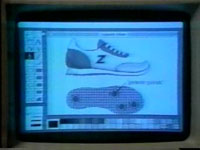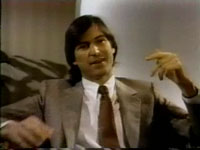 (Apple corporate headquarters)
(Apple corporate headquarters)This feature (the first in the "Evolution of a Computer" series) introduces the Macintosh. It presents the Macintosh as part of a high-risk, high-reward strategy by Apple to maintain its preeminence in the computer industry. It also suggests that the Macintosh shows Apple hasn't become a corporate giant, and maintains its small-company culture: as Steve Jobs says, "What we wanted to do with Macintosh was to sort of recreate that Apple II spirit."
The theme of the Macintosh setting a "third industry standard" was worked out by Apple and strategic marketing consultants from Regis McKenna.
Voice-over: The personal computer industry had grown in less than a decade to a $15 billion business, and experts predict that it will reach $80 to $90 billion by the end of the decade.
 (Apple corporate headquarters)
(Apple corporate headquarters)
But now, while the industry is going through a shakeout where only the fittest survive, Apple is concentrating not on survival tactics, but future tactics.
John Scully: The personal computer industry is still in that early phase of being defined. And if we were to accept what it is today, we would be not living up to a responsibility that we have of taking technology and bringing it togeher with what people need, with what people want.
Voice-over: That responsibility led Apple to embark on a three-year endeavor to redefine the market, and to bring new meaning to personal computing.
 (Macintosh screen. This picture of a tennis shoe appears
in a number of launch-time advertisements and articles.)
(Macintosh screen. This picture of a tennis shoe appears
in a number of launch-time advertisements and articles.)
It's answer: Macintosh. Using state-of-the-art technology to realize a faster-processing computer, one that's easier to understand, easier to use, easier to transport.
 (Apple co-founder Steve Jobs)
(Apple co-founder Steve Jobs)
Steve Jobs: When we designed the Apple II in 1977, we used state-of-the-art technology from 1977. What we wanted to do with Macintosh was to sort of recreate that Apple II spirit in 1984.
 (Scene from the Macintosh factory)
(Scene from the Macintosh factory)
Voice-over: That meant making Macintosh affordable for tens of millions of people, rather than tens of thousands. It meant takin risks that critics warned could be fatal, because revolutionary products set their own standards, rather than follow standards of the past.
Industry analyst: It's the companies who are constantly striving technologically to be one step ahead of the pack, to strive for new standards and new levels of quality, tend to be the most stable and long-standing companies, as compared to companies who choose to react to someone else's success and duplicate it.
 (Macintosh testing)
(Macintosh testing)
Voice-over: And Apple is confident that its determination to stay ahead of the pack will pay off in the form of Macintosh setting a new industry standard.
Steve Jobs: We're gambling on our vision; and we'd rather do that than make "me-too" products. Let some other company do that.